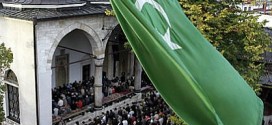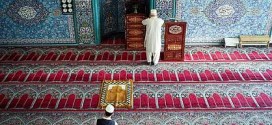Al-Wasatiyyah (Moderation) as an Agenda of the Ummah
Assoc. Prof. Dr. Spahic Omer
Kulliyyah of Architecture and Environmental Design
International Islamic University Malaysia
The term al-wasatiyyah is derived from an Arabic word “wasat” which means middle, fair, just, moderate, milieu and setting. The word in its different forms is used in several contexts in the Qur’an, all the word forms revolving around similar linguistic meanings. Allah says: “Thus, have We made of you an Ummah (Community) justly balanced (wasatan), that ye might be witnesses over the nations, and the Messenger a witness over yourselves…” (al-Baqarah 143).
Also: “The best of them (awsatuhum) said: Did I not say to you, Why do you not glorify (Allah)?” (al-Qalam 28)
“Be guardians of your prayers, and of the midmost (wusta) prayer, and stand up with devotion to Allah.” (al-Baqarah 238)
“And penetrate forthwith into the midst (wasatna) (of the foe) en masse.” (al-‘Adiyat 5)
And: “…So its expiation is the feeding of ten poor men out of the middling (awsat) (food) you feed your families with…” (al-Ma’idah 89)
However, the first verse and its messages signify a perspective which is principally used for advancing the nucleus of the al-wasatiyyah (moderation) paradigm. Accordingly, when Allah describes Muslims as “ummatan wasatan” (justly balanced ummah), the impression thus conveyed is that Islam is a religion of peace, moderation and impartiality, not of extremism, prejudice and intolerance. An ummah and its cultures and civilization, which have been established and molded by the vitality of Islam, are to be adorned with the same attributes and traits. Moreover, Islam is a religion of amity, justice, harmony and moderation with the Creator, self, people and at once built and natural environments. These ideals of total balance and equilibrium are to be promulgated and practiced at each and every tier of Muslim existence — including built environment — without compromising on honesty, integrity and truth. Indeed, this dimension of Islam is critical because so long as there is no peace, harmony or justice with God, there could be no peace, harmony or justice with self either. And surely, so long as there is no peace, justice or harmony with God and self, there could be no amity, harmony or fairness with people either, and with the rest of the constituents in the intricate web of creation.
Al-wasatiyyah, it goes without saying, is multidimensional. It is corporeal, psychological, intellectual and spiritual. It is at once a philosophy and a way of life. It is comprehensive, in that it integrates and balances the requisites and delights of this world and the Hereafter, as well as of the physical and spiritual domains of existence. And it is universal, in that it affects the total wellbeing firstly of Muslims and then of all people and indeed of all animate and inanimate beings. Al-wasatiyyah, thus, is a Muslim identity. So important is al-wasatiyyah in Islam that it is almost synonymous with everything that carries the adjective “Islamic”. It is because of this that for Sheikh Yusuf al-Qaradawi the first principle of moderate and justly balanced thought is “a complete and comprehensive understanding of Islam, which is characterized as being a creed and a way, knowledge and action, worship and interaction, culture and character, truth and strength, an invitation and political engagement, religion and reality, civilization and a nation.” In the same vein, according to Mohd Kamal Hassan, another implications of the notion of al-wasatiyyah for contemporary Muslim society include balancing between the permanent principles of Islamic law and the changing conditions of the time; the coupling of religious duty with the social reality; engaging in dialogue and coexistence with other people, and practicing tolerance with those who differ; as well as presenting Islam as a balanced, integrated civilizational mission for the revival, liberation and unification of the ummah.
In agreement with a divine decree, the Muslim ummah charged with the morals and quintessence of al-wasatiyyah is destined to serve as a role model to other nations and communities, confidently leading and guiding them through life’s challenges, trials and mysteries. This is so on account of an established historical truth that all man-generated life systems, ideologies and “solutions” in the absence of legitimate revealed truth and direction gradually fade away as soon as they come to civilization’s fore, except the revelation inspired and guided life system, ideology and “solution” of Islam. The justly balanced Muslim ummah, characterized as truthful, altruistic, cultured and sophisticated, is thus to serve as a witness over others, to selflessly intervene in the cause of peace and justice and to function as mankind’s ultimate source of optimism, luminosity and hope. Hence, following the pronouncement in the first of the five above-quoted Qur’anic verses that Muslims are “ummatan wasatan” (justly balanced ummah), Allah proclaims next that such is the case so “that ye might be witnesses over the nations”.
Furthermore, the subsequent Allah’s words in the same verse: “and the Messenger a witness over yourselves”, emphatically implies that to Muslims in their whole al-wasatiyyah enterprise, Prophet Muhammad (pbuh) and the revealed Word constitute the supreme point of reference as well as the infinite sources of inspiration, zeal and legitimacy. Were it not for the Prophet (pbuh) and the revealed guidance, Muslims and their civilizational representation would have been stripped of their intrinsic perpetual potency, light, honor and purity. Theirs and their civilization’s fate would eventually have become similar to the fates of the rest of mankind’s ephemeral civilizational endeavors and experiments. It follows that what Muslims are expected to be to others in the physical world, that is what the Prophet (pbuh) is to them in both the physical and metaphysical worlds.
 Dzemat Braunau
Dzemat Braunau


